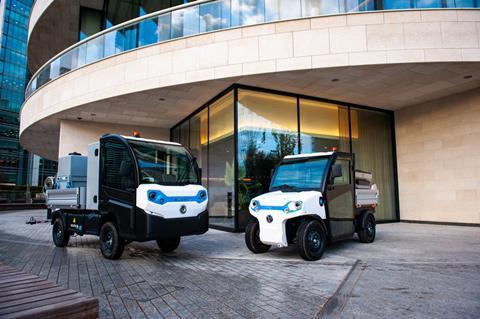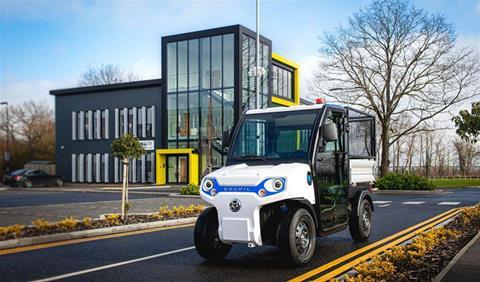Battery electric vehicles are sometimes regarded as new-fangled devices but they were first seen on the roads of Europe in the 1890s and in the 1960s the UK had the world’s largest fleet of BEVs in the days when electric milk floats were a common sight on every street. Today home delivery operator Milk & More still runs 400 BEVs in its fleet of 1,200 delivery vans.

Peterborough-based Bradshaw Electric Vehicles has been producing BEVs since 1976 and, in 2017, became the sole UK distributor for French BEV manufacturer Goupil, part of the US-based $3bn a year Polaris Industries.
It is also the UK distributor for Club Car, which focuses more on the leisure sector including golf courses. They make excellent passenger carriers and visitors to Road Transport Expo would have seen them ferrying people around the Stoneleigh showground.
Bradshaw marketing manager Ramsy Labassi says that when the company, which was focused on off-road industrial and utility vehicles, was looking for a partner to expand its range into road-going vehicles, it looked at a couple of options, including Goupil.
“Goupil already had a presence in the UK but had a problem in that whilst they were selling well, there wasn’t a dealership or distribution partner who held stock or look after the vehicles when repairs were needed,” he says. “So, Bradshaw took on the licence and became the sole distributors for Goupil, managing new sales, parts and maintenance.”
“Bradshaw had been banging the electric drum since 1976, supplying electric vehicles for use mainly around industrial sites. When we started looking at electric vehicles for roads seven or eight years ago we were told it wouldn’t work – but we knew which direction the market was heading.”
Goupil was started in 1986 and can now produce around 5,000 units a year at its factory in the south of France.
The Goupil range consists of the G2 and G4, both homologated for road use. The G2 is categorised as an L7e, and the G4 as an N1. The G4 can be supplied with left—or right-hand drive, while the G2 is left-hand drive only. Available with either Lead-Acid or Lithium batteries and a wide range of body options, the G2 and G4 are ideal for urban and city use.
“We have the right product at the right time that can fulfil the needs of a number of sectors,” says Labassi. “The G4 has a maximum speed of 31mph and 11 different body options, including cage, van and high-tip waste collection. The modular chassis enables the G4 to be converted for a plethora of uses; we have seen G4s converted to include cranes, cherry pickers, and hot pressure washers, as well as a mobile coffee van and first response on-site fire engine.
“The payload is comparable to a Transit van whilst maintaining compact dimensions. They are very robust, very capable around sites or on the roads and a good strong workhorse.”
Typical applications in the UK include site maintenance and municipal waste and cleansing services, and they have proved especially popular with local authorities, health trusts and universities. “They are great alternative to a Transit because the payload is there,” says Labassi. “The other beauty of the vehicles is they can be used for seasonal use. You can take a cage body, then remove the sides and you have a pick-up.
“Then you can put a pressure washer on for summer work like watering or street cleansing then change it for a leaf collector in the autumn before putting a demountable gritter unit on the back for winter.”
“They are a good alternative for anyone operating a diesel vehicle at lower speeds. Due to diesel particular filters issues, we are finding customers are switching to electric as diesel maintenance is so costly and causes vehicle down time.”
Bradshaw is unusual among BEV suppliers in still offering a lead-acid battery option alongside the more typical lithium-ion.
“Around 60% of Goupils will be sold with lead-acid and we very much believe you don’t need to over egg the product,” says Labassi. “It all depends on what you need the vehicle to do. For site maintenance where you are only doing a mile or two a day why do you need the expense of lithium batteries? But if you need to maximise payload and range, or need a fast recharge, lithium would be the better choice.”

The extra £6,000 for lithium batteries will for example boost the range on the G4 from 50 miles to up to 100 miles.
“Picnic in the Netherlands, for example, run an online supermarket delivery service with fixed routes,” says Labassi. “They have a larger body, and they need range as well as payload, so they have the bigger lithium battery pack. They charge it overnight and opportunity charge during the deliveries, which is an option you don’t get with lead-acid.”
Picnic runs over 3,000 G4s on its home delivery service, which now accounts for 20% of the Netherlands’ online grocery sales, and the firm is moving into France and Germany. The Goupil’s slightly quirky look is integral to its marketing and it has an exclusive agreement with the French company.
The other advantage of lithium is longer life, as they can last for 5,000 recharge cycles whereas lead-acid will only take 2,000 cycles. Lithium is also maintenance-free while lead-acid batteries do require some attention to get the best from them.
All Goupils can be recharged with a standard 3-pin plug negating the need for specialised charging infrastructure. “The G4 takes four hours to charge with the small lithium pack while the bigger pack takes six hours,” says Labassi. “There are some operations which don’t charge from one week to the next.”














